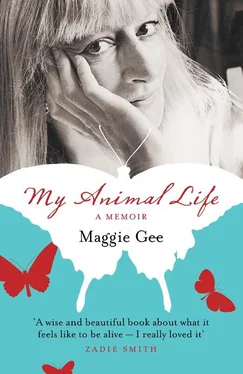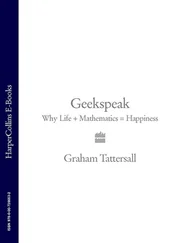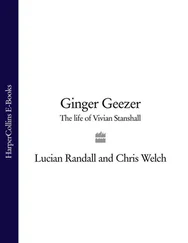
John, Mum, Dad and me, five years before younger brother James was born
Not if the deepest level is the oldest, the thing-that-you-know-before-knowing-you-are-thinking, no, I am not just that.
Because I was born into those two families, the Gees and the Churches, both working-class through and through: and a grain of their toughness, an inherited sense of being an outsider looking slightly askance at what the privileged get up to, remains at the core of my adult self. True, my parents, Vic and Aileen, let their brains take them as far as they could from Bucks and outside plumbing and the narrowness of terraces.
Was it easy to move away? It must have been exciting, striking out on their own, going southwards, sunwards to Hazlemere and then Poole, where they knew nobody, to raise their young family. For my mother at first it was a liberation; in the final year of the war she had had to care for a baby, my brother John, living with the family of her absent husband in Wolverton, afraid that the baby’s crying would wake up her ‘cut above’ in-laws, the Gees. Once Vic was home from India, Aileen became entangled in the web of Gee-family over-sensitivity. She told me that every day she was afraid Dad might find his prone-to-tears mother crying, in which case he would come and find her and ask, ‘What have you been doing to upset Ma?’ The idea of their own place in the south, away from all this, was intoxicating.
I mustn’t think going so far was simple for them. Most Gees and Churches stayed put, keeping the habits and social links they were born with. It was easier for my parents to move than to arrive. There’s a grain of something concretely real in that unpleasantly snobbish term ‘arriviste’ . Because arriving in a new class isn’t something you do and then forget; it can be a never-ending, restless state. You leave once, but always continue to look for a welcome, and follow clues how to behave.
New houses! That was what they wanted, new beginnings. ‘New build’. The thing that my generation avoids unless they can afford something edgy and architect-built. But Vic and Aileen both wanted to escape the dark and the fustiness. They had come through the war! Young marrieds on the cusp between their twenties and thirties. Both fiercely clever in different ways and recognising that quality in each other, they were eager for the future, but the first few houses they lived in — Hazlemere, Poole, Barnt Green, Bromsgrove, Watersfield, because my father was ambitious for promotions in teaching and they kept on the move — were all compromise, pre-war housing, one Edwardian, one 1940s, and so on.
How they loved the idea of their first all-new home. The Croft, Oaklands, Billingshurst, Sussex, where they moved in 1956, when I was seven, was a three-bed cross between a house and a bungalow, with two downstairs bedrooms for the children. My parents’ bedroom and loo, side by side with my father’s darkroom for photography, were perched on their own, upstairs. Built new for them! They fell in love (via the pencil drawings, which they proudly showed their children) with the big semi-circular bay window at the front, which took up half the width of the house. Both had their own sense of beauty, and a wish to be different, though my father’s was constrained by a streak of fearful conservatism he denied; between them they chose, to curtain that giant bay, a repeated small 1960s line-drawing of a man driving a donkey-cart, back view, which promised them holidays, relaxation, the country, all things which proved not so easy to find; but they bought it in three different pastel colours, giving a daring rainbow effect when the curtains were closed. In that window, in the blaze of sun, stood also my father’s ‘Stereomaster’, a radio-cum-record-player of monumental dimensions, with late 1950s splayed legs and a cabinet of pale wood (which my mother secretly disliked: ‘It’s like a coffin,’ she whispered to me, once its novelty wore off. No wonder she resented it when no one but Dad was allowed to touch it; he was extending his musical tastes, and liked to have female opera-singers, out of Radio 3, at breakfast; ‘that bloomin’ screaming’, Mum called it.)
But on the drawing-board this house, for us all, was to be perfect, the final stage in our ascension from Bucks, via Poole (and a small retreat, reculer pour mieux sauter , to the midlands) to Sussex. My own part of the excitement was choosing paint for my bedroom. Remember the rarity of luxury and colour in that austere post-war world of the fifties, the scarcity of ornament and print. So the paint manufacturer’s cards with their tiny neat pools of gloss or matte colour, dozens of shades all subtly different, the smell of the cardboard and the feel to my fingertips of the cool slippery gloss, were artefacts of rare beauty. Each small bright rectangle of paint had a number which led you to a correspondingly wonderful name: Jasmine Yellow, Duck-egg Blue, Apricot Pink. I changed my mind over and over again.
Yet the room, when finally unveiled, was a bad disappointment. I was sure that my parents had muddled up my choices. One wall was a murky blue-green, one a fleshy, overbearing pinky-orange, two were yellow, and clashed with the pink. And there were acid yellow curtains with a pattern of rickshaw-pulling coolies with pigtails; I definitely hadn’t chosen those . I raged and complained.
My poor parents. They had wanted me to be pleased, and let me choose. Instead I made everyone unhappy. I insisted, and cried, and screamed, that I had never chosen these horrors. I wanted to be myself . My family was totally unsatisfactory.
Looking back, what threw me was the difference between real paint and the ideal poetry of names.
We lived in the Croft for two decades, until the mid-seventies, for my father had got his headship (‘I was one of the youngest heads in the country’), and stayed until retirement, his youth worn away, jaw jutting forward with the strain of the job to which he walked off every morning, a three-minute walk in his long grey-beige gaberdine mack to the big modern school at the bottom of our garden which he steered from a secondary modern to one of the first comprehensives. My brother John and I grew up and became adolescents, though we weren’t modern teenagers at all. John, tall and skinny with very long arms, a vulnerable Adam’s apple, full sensual lips and a brilliant mathematical brain, came effortlessly top of all subjects at his excellent grammar school, Colyers, and was a demon fast bowler in the Billingshurst cricket team, ‘over-bowled’ by the captain, as Dad said, despairingly, thinking of future arthritis as John pounded away summer Saturdays notching up wickets. John was a Manchester United fan like my father, and went out with the girl next door. What better son could be imagined? My father loved him to a painful degree, yet he fought with him; too much testosterone under one roof. I too was a good teenager in many ways, a bad one in others. Like John, I was both a swot and a sports fiend; I was sexually innocent, neither drank nor took drugs (I was saving things up for later, getting up a head of pressure so the eventual explosion would be worthwhile). Yes, I tormented my kind mother with cruel remarks, refused to eat with my family, read half the night, hated my father, started to be weird about food. But in public terms, both John and I were successes. In private we raged and stormed and, in the end, partially curbed ourselves; one by one, as raw seventeen-year-olds, before things could get too bad, we went away. Another brother was born, the baby of the family, Jamey or James, nearly ten years younger than me, a blond-curled, blue-eyed boy of great beauty and perfect eyesight, whereas John and I were both wiry bespectacled children with knobbly joints and big ears, then awkward adolescents who couldn’t wait to be twenty. In time James became a teenager, actually a teenager, unlike his two elder siblings, dancing to T-Rex, being a proto-communist, bringing girlfriends home. And as all these things happened Vic and Aileen aged from their thirties into their fifties, and certain things became set, and others, in the hothouse of our adolescence, burst and broke, and some of the hopes of the big sunny bay were disappointed, and others, for the next generation’s success, were exceeded.
Читать дальше













